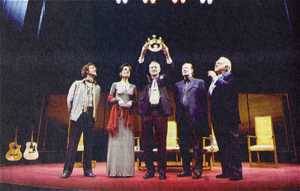Revival is a lesson in the art of
great acting
It was the late Richard Burton who said that being
taken into the Welsh hills for vocal training was what gave him the ability to
bounce his voice off the back of the stalls in a packed auditorium at the Old
Vic. It is unlikely that Donald Sinden employed precisely those methods to
cultivate his larynx - but the effect is pretty much the same.
|
Sinden is able, in the current production of
John Barton's The Hollow Crown at the Royal Shakespeare Theatre, to cut
through the atmosphere with his famous megaphone of a voice at a decibel level
that at times would have rivalled Regimental Sergeant Major Ron Brittain of the
Coldstream Guards, the man who was once described as having the loudest voice
in the British Army. |

|
The Voice
What is extraordinary is that Sinden, despite his
advancing years, has lost none of the melody of his distinctive tone. If
anything, it is an even richer sound than when he was younger, even more deeply
mellifluous than in the past. But Sinden, like the other performers on the
stage - Richard Johnson, Alan Howard and Harriet Walter - comes from a school
of acting that regarded The Voice as one of the most essential weapons in an
actor's armoury. And with that vocal projection comes precise enunciation and
clear diction.
The Hollow Crown, created by John Barton over
40 years ago and directed by him in this production, is a whimsical and
literary look at history using the words of English kings and queens through
the ages, those who knew them and those who wrote about them - either from
direct experience or from a less exact position. It is, in Barton's own words,
"an entertainment" and thus, by definition, a rather less than serious
depiction of monarchs - from William the Conqueror to the young Queen Victoria.
And we even have "King" Arthur at the end, from Malory's Le Morte
D'Arthur.
The actors sit on chairs in front of a table, and get
up - script in hand - when they come to speak their parts. They are at times
serious, but more often comic, in delivering the lines laid in front of them.
There are moments when the pace slackens, but they are few. Overall these are
consummate performances by actors well practised in the craft of holding an
audience's admiring attention.
Richard Johnson exudes authority, despite a very
occasional minor first night fluff. Harriet Walter is wonderfully prim as a
15-year-old Jane Austen and superbly funny as the novelist Fanny Burney - full
of tongue-tied embarrassment - discussing the arts over tea with George III.
Alan Howard's contributions include a brilliant rendering of James I 's famous
Counterblast to Tobacco. And Stephen Gray is excellent as the
guitar-playing balladeer that adds a musical dimension to the
proceedings.
But if there has to be a star of the show, the prize
goes to Donald Sinden. The sheer force of his personality - his physical and
vocal theatricality - is so commanding that it fills the stage whenever he
struts upon it. His description from The Greville Memoirs of the dinners
hosted by William IV is side-splittingly funny, particularly the line about the
"hip-hipping" in choruses of three cheers for the king! And those famous vocal
chords, showing no signs of wear, swell like trumpet blasts to fill the entire
building's acoustic.
Preston Witts
The Stratford-upon-Avon Herald,
10.3.05.
